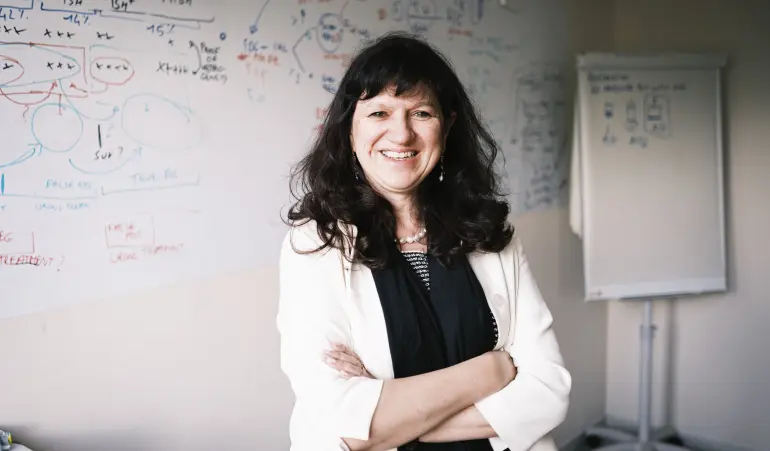How ABSCINT is redefining cancer diagnostics

ABSCINT is a molecular imaging company. ABSCINT has two lead programs in clinical stage, one in cardiovascular disease and one in oncology.
Founded: 2020, VUB spin-off
FTEs: 7 (2025)
Funding: €3M
Stage: Phase 2 (breast cancer)
Tracer: 68Ga-ABSCINT-206
Product launch goal: 2028 (EU/NA)
Target locked, ready to eliminate breast cancer
ABSCINT is a clinical-stage company developing next-generation in vivo imaging diagnostics, with a particular focus on PET tracers (positron emission tomography). Founded in 2020 as a spin-off from the Vrije Universiteit Brussel (VUB), the company takes its name from a blend of “antibody” and “scintigraphy” — a nod to its core technology and mission.
Based at LegiaPark in Liège, ABSCINT is involved in several clinical studies, including a newly launched Phase 2 trial in metastatic breast cancer. Backed by a recent , the company aims to improve how patients are selected for targeted treatments by visualising HER2 expression across all tumour lesions, a critical step for more precise therapy.
“We generate a full-body image that shows all cancer lesions expressing the HER2 target,” says CEO Karine Clauwaert. “Our technology helps better characterise tumours and guide treatment decisions.”
A boost from M2Target
Part of ABSCINT’s early momentum came from M2 Targets, a collaborative R&D project launched in 2021. The project focused on developing a non-invasive method to detect a type of immune cell called the M2 macrophage. These cells are involved in a range of inflammatory diseases, including cardiac sarcoidosis, a rare and often overlooked condition that causes inflammation in the heart. If caught early, it can be treated. But diagnosing it in time remains a challenge. That’s what M2Target set out to change.
At the heart of the project was a new PET tracer (named 68Ga-ABSCINT-206) developed at VUB. It uses nanobodies, small antibody fragments, that bind to a specific marker on M2 macrophages. This allows doctors to track these immune cells inside the body using imaging, potentially spotting disease earlier and following how it evolves over time.
A team of sharpshooters
To bring this innovation to life, ABSCINT teamed up with several partners: IRE, XPress Biologics, and academic teams from UCLouvain and VUB. Each partner played a key role, from producing the tracer and handling radiolabelling, to managing preclinical and clinical research.
Trust between the partners of the project was essential.
“The consortium was very complementary,” says Karine Clauwaert, CEO of ABSCINT. “We worked with XPress Biologics for production, IRE for radiolabelling, and the universities helped with the clinical and preclinical work. Everyone brought something essential to the table.”
Support from BioWin also helped during the early stages of the project.
“The help we received from BioWin was extremely important,” Karine adds. “They asked the right questions and gave us advice that helped shape the project and the way we presented it.”
Anchored in Wallonia but open to the world
Thanks to M2Target and its ongoing clinical work, ABSCINT has built a solid base in Wallonia. At the time of writing the company consists of a team of 7 people and has different collaborations in the Walloon region. ABSCINT aims to launch its first diagnostic products in 2028, starting in Europe and North America and then expanding to Asia, and other international markets. The company’s focus is on providing accurate, patient-friendly diagnostics.
“By staying purely diagnostic, we can collaborate openly with any company working on treatments,” says Karine. “We’re not in competition; we’re a complementary partner.”
To support its global outlook, ABSCINT also took part in a nuclear medicine mission to the USA and Canada, organised by AWEX, the Walloon Export and Foreign Investment Agency.
“The US and Canada are important regions for innovation in nuclear medicine. This mission helped us explore collaborations and better understand local regulatory paths,” Karine explains.
“Our product is currently in clinical trials at several leading hospitals — including Institut Jules Bordet, UZ Brussel, Chirec, Onze-Lieve-Vrouwziekenhuis, and Cliniques Universitaires Saint-Luc and UZ Leuven,” Karine says. In addition to these healthcare institutes, ABSCINT’s technology is already being used far beyond Belgium. “We’re also involved in investigator-led studies in Germany, Austria, Australia, and France, and we’re actively looking to expand. Our ambition is clear: we want to build strong partnerships in North America to take this technology even further.”
Small team, big ambitions
ABSCINT’s story is a clear example of how local innovation, strong partnerships, and international ambition can come together to build something lasting. What began as a university spin-off is now a clinical-stage company, well positioned to make a meaningful impact in diagnostic medicines.
“We hope our diagnostic products will help doctors make accurate diagnoses and choose the right therapy for each patient,” Karine says. “That’s what drives us.”
To find out more about the company and its work, visit www.ABSCINT.com